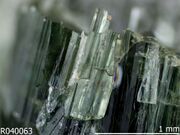Difference between revisions of "Actinolite"
Jump to navigation
Jump to search
| Line 13: | Line 13: | ||
* Luster = vitreous to silky | * Luster = vitreous to silky | ||
* Streak = colorless | * Streak = colorless | ||
| − | * Cleavage | + | * Cleavage = perfect in two directions |
| + | * Fracture = splintery to granular | ||
| + | * Fluorescence = inert | ||
{| class="wikitable" | {| class="wikitable" | ||
Latest revision as of 12:02, 16 December 2022
Description
Green to black acicular to bladed crystals composed of calcium-magnesium silicate. Actinolite mixed with tremolite forms Nephrite, a translucent green mineral that is one of the forms of Jade. Actinolite deposits occur in Great Britain, Russia, Japan, China, Australia, Brazil, Canada (British Columbia), and the U.S. (Alaska, California, Wyoming and Vermont). It is often found in association with talc and chlorite. The transparent to opaque stone is used as a filler in paints and ceramics.
Synonyms and Related Terms
nephrite
Physical and Chemical Properties
- Monoclinic system with fibrous crystalline masses
- Luster = vitreous to silky
- Streak = colorless
- Cleavage = perfect in two directions
- Fracture = splintery to granular
- Fluorescence = inert
| Composition | Ca2(MgFe)5Si8O22(OH)2 |
|---|---|
| Mohs Hardness | 5.0-6.0 |
| Density | 3.0-3.2 g/ml |
| Refractive Index | 1.60-1.64 |
Resources and Citations
- Mineralogy Database: actinolite
- C.W.Chesterman, K.E.Lowe, Audubon Society Field Guide to North American Rocks and Minerals, Alfred A. Knopf, New York, 1979
- Wikipedia at http://en.wikipedia.org/wiki/Actinolite (accessed Sept. 2007)
- MinDat.org: actinolite (accessed Sept. 2007); sp. grav.=3.03-3.24; streak=white; cleavage=good in one direction

